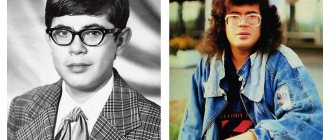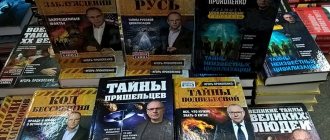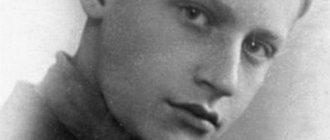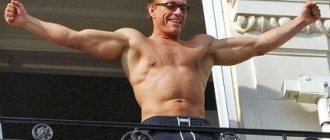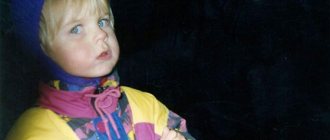Biography
Igor Kostolevsky was born into an intelligent and wealthy family.
His father Matvey Matveevich held the position of head of Exportles of the USSR Ministry of Foreign Trade. Cousin - composer and conductor Matvey Robertovich Kostolevsky, Honored Artist of the Russian Federation. When the time came to choose a profession, my parents insisted on getting a serious specialty. And Kostolevsky entered the Moscow Civil Engineering Institute. But already in the third year he realized that this was not his business. I decided to try myself in the theater, I entered the Moscow Art Theater School, but they did not accept me. Then there were successful entrance exams at GITIS: in 1969, Igor became a student at the directing and acting department, which was headed by the famous director Andrei Goncharov.
Childhood and school
Igor was born on September 10, 1948 into a wealthy and intelligent Moscow family.
His father, Matvey Matveevich Kostolevsky, born in 1908, served in the Ministry of Foreign Trade of the Soviet Union and worked as the head of Exportles.
Mom, Vitta Semyonovna Kostolevskaya, born in 1910, was a very educated woman who knew six languages. After the birth of her sons (Igor also has an older brother, Valery), she did not work, but was involved in their upbringing and housekeeping. Vitta Semyonovna was a long-liver and died in 2011. Having lived for more than a century, until her last days she had a sense of humor and a clear mind.
Igor was a very naughty boy as a child; he grew up as a hooligan and caused his parents a lot of problems. The elder brother suffered the most from his pranks. At the age of five, Igorek drew his drawing, which Valery worked on for several days. At that time, he was already a student at the institute and dreamed of getting the highest score for his project. The guy did not appreciate the joke of his younger brother, who wrote “A” in ink on a neat drawing, and became very angry.
Kostolevsky had the same behavior at school. He often drove the teachers to white heat, for which he was even kicked out of class and his parents were called to school. But studying came easy to him. He was fond of boxing, took part in fights in the ring, and achieved good results. But in adolescence, I realized that this way of proving that I was right was not the best.
Theater
After graduating from GITIS, Igor Matveevich connected his life with the Mayakovsky Academic Theater, where his teacher Andrei Goncharov was the artistic director. It cannot be said that the director spoiled Igor with his attention: Kostolevsky “ran among the crowd” for many years. “I don’t regret anything and I’m even grateful to Andrei Alexandrovich for this school of profession and school of life,” the actor told RIA Novosti. “After what I went through, I’m no longer afraid of anything.”
The first major theatrical work was the role of King in the play “Look Who Came” directed by Boris Morozov. It was a real success, a work that was highly appreciated by critics and audiences. This was a turning point in the artist’s theatrical career.
In the 2000s, Kostolevsky is one of the most successful and sought-after actors in Mayakovka, he plays 12-13 performances a month. Director Sergei Artsibashev used the actor in a wide repertoire, including the roles of Ivan Karamazov in The Brothers Karamazov, Podkolesin in Marriage, Plyushkin in Dead Souls. He also played in Chekhov's "The Seagull", "The Circle" by Maugham, "The Brothers Karamazov" by Dostoevsky, "The Fruits of Enlightenment" by Leo Tolstoy, "Running" by Bulgakov, "Kin IV" by Grigory Gorin.
“These roles brought Igor incredible success, he became a real idol of millions,” says People’s Artist of Russia Evgenia Simonova, who met Kostolevsky 40 years ago when she was accepted into the troupe of the Mayakovsky Theater. “We know a lot of legends about how we idolized the greats - Ermolov, Kachalov, and here I was an eyewitness to Igor’s crazy popularity. We played a performance together in Leningrad, at the end of which it was literally filled with flowers, and a huge crowd stood at the entrance, waiting to at least see their favorite artist. Surprisingly, this did not affect Igor in any way, which is rare. Not once during all this time did I notice even a hint of “resting on one’s laurels.”
Now the artist is involved in five theater performances: “Caucasian Chalk Circle”, “Fruits of Enlightenment”, “Kant”, “Talents and Admirers” and “Dead Souls”.
Theater works[ | ]
- 1976 - “Counted Days” by G. Nemchenko - a radio play directed by Boris Kondratyev based on the novel of the same name, staged by the Moscow Academic Theater named after V. Mayakovsky - Valentin Nesterov, journalist
- Arnold (“The Circle” by S. Maugham)
- Vasily Leonidovich, Leonid Fedorovich Zvezdintsev (“Fruits of Enlightenment” by L. Tolstoy) [33]
- Golubkov (“Running” by M. Bulgakov)
- Ivan Ivanovich (“How We Quarreled” by N. Gogol)
- Ivan Karamazov (“The Karamazovs” after F. Dostoevsky)
- Mozart and Salieri (“Theater director” based on the works of A. S. Pushkin, V. A. Mozart, A. Salieri. Theater agency “Art-Partner XXI”)
- Plyushkin, governor (“Dead Souls” by N. Gogol)
- Podkolesin (“Marriage” by N. Gogol)
- Prince of Wales (Kin IV by G. Gorin)
- Torvald Helmer (A Doll's House (The Burrow) by G. Ibsen)
- Treplev (The Seagull by A. Chekhov)
- Eric Larsen (“Mysterious Variations” by E. Schmitt)
- 2012 - Prince Dulebov - “Talents and Admirers” by Alexander Ostrovsky, director Mindaugas Karbauskis
- 2013 - Peter Stockman - “Enemy of the People” by Henrik Ibsen (version by Sasha Denisova), director Nikita Kobelev
- 2013 - Johann Schulz - “Kant” by Marius Ivaskevicius, director Mindaugas Karbauskis
- 2015 — Zvezdintsev Leonid Fedorovich — “The Fruits of Enlightenment” by L. N. Tolstoy, director Mindaugas Karbauskis
- 2016 - Azdak - “The Caucasian Chalk Circle” by Bertolt Brecht, director Nikita Kobelev
- 2017 - Henry Higgins - “Pygmalion” by Bernard Shaw, director Leonid Kheifets
- 2020 - Sarafanov - “The Eldest Son” by Alexander Vampilov, director Anatoly Shuliev
On the European stage
In the second half of the 1980s, Kostolevsky, who was experiencing problems with roles in his native theater, signed a contract in Norway and went there for six months. “Then came perestroika, we had to survive and earn money,” recalls Igor Matveevich. As a result, when I was offered a contract in Norway, I went there for six months and played one of my best roles - the Messenger in Aeschylus's Oresteia. The reviews stated: “with an emaciated face, in a torn soldier’s shirt, he seemed to be the messenger of all those who had died on the battlefield.”
“And then I returned to Russia - Peter Stein invited me, also in The Oresteia for the role of Apollo. And only after that the real work in the theater began,” says the actor.
Movie
National fame came to Igor Kostolevsky thanks to cinema. Igor Matveevich’s debut role was an unnamed MAI student from the film “Family Like Family,” released in 1970. In 1972, he played a minor role in Stanislav Rostotsky’s famous film about the war, “The Dawns Here Are Quiet.”
In 1975, in the corridor of Lenfilm, the actor saw a door with the inscription “Star of Captivating Happiness.” Igor asked his assistant about the content of the film and, having heard about the Decembrists, said: “I will film there.” The film made Igor Matveevich a star of Russian cinema and gave him the role of a romantic hero, who conquered millions of women across the country with his charm and appearance.
Kostolevsky’s next successful role was Marin Miroju from the film “The Nameless Star.” Most of all, the actor remembered the atmosphere created by director Mikhail Kozakov in the film, as well as the emotions that the film was supposed to evoke in the audience.
In 1989, the detective film “Tehran-43” was released, expanding the boundaries of Igor Matveevich’s role. From a romantic hero, he turned into a heroic intelligence officer, courageously going through all the hardships of wartime. For a more authentic performance, the actor had the opportunity to meet the real prototype of his character, Gevork Vartanyan.
Kostolevsky’s work in the films “Spring Call” and “Asya” directed by Joseph Kheifits received high marks from film experts.
In 1978, Kostolevsky became a laureate of the Lenin Komsomol Prize for playing the role of Yevgeny Stoletov in the six-episode television film “And That’s All About Him.”
In 1981, Igor starred in the very popular romantic comedy Vacation at Your Own Expense in the USSR.
The event of 1985 was the melodrama “Legitimate Marriage” by Albert Mkrtchyan, where Igor, in a duet with Natalia Belokhvostikova, played the theme of love buried by war with the burning truth of life, accompanied by the musical masterpiece of Isaac Schwartz. According to a survey by the Soviet Screen magazine, Kostolevsky was recognized as the Best Actor of 1986.
In 2007, an international project unprecedented in scale and budget (26 million euros) was carried out - a film adaptation of Leo Nikolaevich Tolstoy's epic novel War and Peace. Six countries took part in its creation: Italy, France, Russia, Germany, Poland, Spain.
Igor Kostolevsky played Alexander the First. “I immediately agreed to the offer to participate in this film. But I said that I wanted to play Emperor Alexander I. On the first day of shooting, I ask the director: “How should I sit on the throne?” Robert Dornhelm replied: “You are the king! You can sit however you want!”
Igor Kostolevsky continues to act in films, preferring character roles and the detective genre. In 2008, he played a scout in the series “Spy Games,” and in 2010, a multi-part film with his participation, “In the Forests and on the Mountains,” was released.
Igor Kostolevsky remains a sought-after actor. Among his latest works are the films: “Time of Happiness”, “The Hindu”, “Chemist”, “Demons”.
In July 2020, the Rossiya TV channel will premiere the detective series “Crime,” in which Igor Matveevich played one of the main roles. The investigation into the brutal murder of a young girl turns into a complex psychological drama, raising questions of human values and meanings that concern everyone: loyalty and betrayal, cynicism and compassion, revenge and humility. An exciting intrigue, during the development of which suspicion falls on each of the main characters, keeps the viewer in constant suspense until the last frame. But one of the main questions that the film poses is whether the heroes will be able to save themselves and remain human?
Biography and creativity[ | ]
Early years[ | ]
Igor Matveevich Kostolevsky was born into the family of the head of the All-Union Association "Exportles"[2][3] of the USSR Ministry of Foreign Trade, Matvey Matveevich Kostolevsky (1908-1993)[4] and Vitta Semyonovna Kostolevskaya (1910-2011). As Chairman of the All-Union Export Association of the People's Commissariat for Foreign Trade of the USSR (NKVT)[5], during the Great Patriotic War, my father supervised the dispatch and unloading of military supplies in the northern ports of the USSR[6], and was awarded the Order of the Badge of Honor and the Red Banner of Labor[7] ; his wife[8] and eldest son Valery (born 1937)[9] were evacuated to Kazan at that time.
As a child, I was involved in boxing, but over the years I realized that fighting is not the best way to defend what is right[10]. After graduating from school, he worked as a tester at the Research Institute of Quartz Industry for two years, then in 1966 he entered the Moscow Civil Engineering Institute.
The beginning of a theatrical and cinematic career[ | ]
In his third year, Igor left the institute and, after an unsuccessful attempt to pass the exams at the Moscow Art Theater School, he entered GITIS on the course of Andrei Aleksandrovich Goncharov. Even in his student years, Igor performed character roles with great enthusiasm. After graduating from the institute in 1973 and being among the three best graduates, Kostolevsky entered the troupe of the Vl. Mayakovsky, with whom almost his entire stage career is connected. Already in the first years he shared a dressing room with Vladimir Samoilov, Boris Tenin, and went on stage with Armen Dzhigarkhanyan and Natalya Gundareva[11]. He played in the plays "Characters" by V. Shukshin, "Our People - Let's Be Numbered" by A. Ostrovsky, "Kin IV" by G. Gorin. About working in the theater under A. A. Goncharov, who gave the actor the role of “comedy simpleton”[11], Kostolevsky, who was busy at the beginning of his career mainly in crowd scenes, later recalled that he was grateful to the main director for putting him in extreme conditions when it was necessary to survive. “It was a difficult, but useful school,” Kostolevsky admitted in his mature years[12].
Kostolevsky began acting in 1970, making his debut in the film “Family as a Family.” Possessing a noble, memorable appearance, the tall and elegant actor with a velvety voice, curly head and chivalrous manners from the very beginning of his cinematic career and for many decades firmly entered the role of a romantic hero, a hero-lover, a melodramatic character[11][13]. Two years later, Igor played Sonya Gurvich’s friend in Stanislav Rostotsky’s film “The Dawns Here Are Quiet.” The peculiarity of this role was the almost complete absence of text from Kostolevsky’s character and the abundance of silent scenes with close-ups, where the play of the eyes was of great importance. Film experts noted that the young actor managed to demonstrate the amazing naturalness of cinematic existence and achieve maximum human authenticity of the image he created.
Popularity in theater and cinema. Main roles[ | ]
Kostolevsky's first leading role - the Decembrist Ivan Annenkov in the film "Star of Captivating Happiness" (1975) by Vladimir Motyl - brought Kostolevsky real popularity in cinema. The director of the film about the Decembrists was attracted by the spirituality of Kostolevsky’s appearance, the expressiveness of the image he created, which combined timidity and passion at the same time, Igor’s ability to convince the audience of the reality of his cavalry guard, and “a strong reserve of humanity.” In the heroic-romantic film, which was a wild success, critics noted the characteristic features of Kostolevsky’s acting style - intellectual charm, emotional openness, gentleness combined with sad irony, imperceptibly turning into lyricism. These qualities also manifested themselves in the comedy melodrama “Nameless Star” by Mikhail Kozakov (1979): both films made Kostolevsky, according to Channel One, “an idol of millions,” “a conqueror of women’s hearts.” After the release of these films, Igor began to be recognized on the streets[13]. A new wave of popularity for the actor was brought by the role of the Soviet intelligence officer Andrei Borodin, who thwarted the plans of fascist agents to eliminate the “Big Three” - Stalin, Roosevelt, Churchill in the action-packed political detective story “Tehran-43” (1980). The director of the film, Vladimir Naumov, especially emphasized the courageous nature of the actor[10]. While working on the role, Kostolevsky met and consulted with the prototype - the legendary Soviet intelligence officer Gevork Vartanyan[13]. The song “Eternal Love” to the music of Georges Garvarentz performed by Charles Aznavour became a worldwide hit and is strongly associated with the image of Kostolevsky’s hero. 30 years later, the orchestras of Moscow restaurants, seeing Kostolevsky entering the establishment, began to perform this nostalgic melody[14].
Kostolevsky’s work in the films “Spring Call” (1975, directed by P. Lyubimov) and, especially, “Asya” (1977) directed by I. Kheifits (with Elena Koreneva), where the actor’s role was built on his characteristic soft charm and restrained spontaneity. At the same time, some critics noted that the directors of each new melodrama are attracted by Kostolevsky’s “cute type,” which in his youth was considered one of the artist’s professional shortcomings. Having realized this, the artist decisively freed himself from the captivity of stereotypes, choosing diverse roles for himself that were not based on the external attractiveness of the character[10][15].
In 1978, Kostolevsky became a laureate of the Lenin Komsomol Prize for playing the role of Yevgeny Stoletov in the six-episode television film “And That’s All About Him.” The romanticism of the tragic image of the young hero who died in the prime of his life, sympathetically created by the actor, coupled with the exciting music of Evgeny Krylatov, contributed to the extraordinary popularity of this film. Soon Kostolevsky joined the CPSU[16]. In 1984, Igor was awarded the title Honored Artist of the RSFSR. The event of 1985 was the melodrama “Legitimate Marriage” by Albert Mkrtchyan, where the actor, in a duet with Natalia Belokhvostikova, played the theme of love buried by war with the burning truth of life, accompanied by the musical masterpiece of Isaac Schwartz. In this film, Kostolevsky masterfully danced tap dancing on camera for the first time[10]. According to a survey by the Soviet Screen magazine, Kostolevsky was recognized as the Best Actor of 1986[17].
The most significant works in the Theater. Mayakovsky's play "Relatives" by E. Braginsky and E. Ryazanov, where Kostolevsky discovered his lyrical and comedic talent, "Savage" by A. Ostrovsky, where the actor acted in a wider range - from lyricism to farce, "Running" by M. Bulgakov, Chekhov's “The Seagull” (Treplev), where the duet with Tatyana Doronina in the role of Arkadina was based, according to critics, on the attractiveness of the incompatible. Important for Kostolevsky was the role of the laureate hairdresser nicknamed King in Boris Morozov’s production of V. Arro’s play “Look Who Came!” (1983), where the actor for the first time in his career played a character with the attractive magic of uncertainty. According to theater experts, King, prophetically played by Kostolevsky, turned out to be the forerunner of the image of the new Russian, the nouveau riche of the 1990s, although with the confidence ahead of the troubled times that the spiritual content of life is an indispensable condition for happiness. In the play “Fruits of Enlightenment” based on L. Tolstoy, staged by Pyotr Fomenko, in “The Circle” based on S. Maugham, in “Kin IV” based on G. Gorin, Kostolevsky, according to critics, discovered “a bright comedic talent, a remarkable mastery of the secrets of tragicomedy.”
On foreign sites[ | ]
Kostolevsky’s creative palette was enriched by collaboration with foreign theater directors. In the second half of the 1980s, Kostolevsky, who was experiencing problems with roles in his native theater, signed a contract in Norway, went there for six months and played one of his best roles - the Messenger in Aeschylus's Oresteia. In the performance, which lasted 6 hours, the tragic, rebellious gift of the actor was revealed with great force, revealing the full horror of war, in which the fate of the winner is not much better than the fate of the vanquished. The reviews stated: “with an emaciated face, in a torn soldier’s shirt, he seemed to be the messenger of all those who had passed away on the battlefield.” After returning to Russia, the artist again played in “The Oresteia” on the stage of the Russian Army Theater at the invitation of director Peter Stein, but this time in the role of Apollo. After this, Kostolevsky resumed a very busy and fruitful theatrical period in his homeland: he was busy in the plays “Kin IV”, “Nora” by Ibsen, “Marriage” at the Pokrovka Theater, “Artaud and His Double” by director Valery Fokin, as well as in many other productions.
Among the works on other stages, the main roles in the plays “Waiting for Godot” (1992, Switzerland), “Victor, or Children in Power” (1994, Moscow Satire Theater), “ART” (1998) stand out.
Recognition and our time[ | ]
Igor Kostolevsky and Ingeborga Dapkunaite at the 2020 Golden Mask ceremony
In 1995, Kostolevsky was awarded the title People's Artist of the Russian Federation.
In 2000, the actor was awarded the State Prize of the Russian Federation for playing the role of Podkolesin in the Theater on Pokrovka's play "The Marriage" by N.V. Gogol. The peculiarity of this unusual performance is that the actor on stage is almost motionless, only his poses and body position change, and all the viewer’s attention is focused on the face of the restless Podkolesin, on observing the variety of “stillnesses”, conveying the whole gamut of moods, thoughts and feelings of Ivan Kuzmich , changing somewhere at the bottom of his soul.
In 2004, in the year of the centenary of Anton Chekhov’s death, as part of an anthology of stories by the Russian classic on Radio Russia, Kostolevsky read one of his most mysterious stories, “The Black Monk.” In the same year, Igor starred in two TV series at once - “Spy Games” and “Manor”. In 2004, the actor was awarded the Order of Honor [15].
In the 2000s, Kostolevsky is one of the most successful and sought-after actors in Mayakovka, he plays 12-13 performances a month[18]. Director Sergei Artsibashev used the actor in a wide repertoire, including the roles of Ivan Karamazov in The Brothers Karamazov, Podkolesin in Marriage, Plyushkin in Dead Souls[12].
In the seasons 2013-2014, 2014-2015, with the arrival at the Theater. Mayakovsky's new director Mindaugas Karbauskis, Kostolevsky is busy in the plays "Enemy of the People", "Talents and Admirers", "Dead Souls" and "Marriage", as well as in the play "Kant" based on the play by the Lithuanian playwright Marius Ivaskevicius. He starred in Vladimir Khotinenko’s series “Demons” based on F. Dostoevsky[11].
For his role as Stockman in the play “Enemy of the People” (2014), he was awarded the prize of the XVIII theater festival “Norwegian Play on the Moscow Stage” in the category “Best Actor”[19].
Kostolevsky is a member of the Union of Cinematographers and the Union of Theater Workers of the Russian Federation. In March 2020, after the death of Georgy Taratorkin, by decision of the secretariat of the Union of Artists of the Russian Federation, he was elected president of the Russian national award “Golden Mask”[20].
Personal life
Igor Matveevich's first wife was an actress of the theater named after. Mayakovsky Elena Romanova. In 1983, their son Alexey was born. He graduated from the Faculty of International Law of MGIMO.
In 2001, Kostolevsky married actress Consuelo de Aviland, who comes from a family of French aristocrats. She is the official representative of Russian Railways JSC in Paris and made a great personal contribution to the resumption of direct railway communication between Moscow and Paris, Moscow and Nice. On December 10, 2020, she was awarded the Order of Friendship of the Russian Federation by Russian President Vladimir Putin for her great personal contribution to the development of Russian-French relations.
Titles and awards
- Honored Artist of the RSFSR (1984)
- People's Artist of the Russian Federation (1995)
- Moscow City Hall Prize (1997) - for participation in the play “Marriage”.
- State Prize of the Russian Federation (2000) for his performance of the role of Podkolesin in the Theater on Pokrovka play “Marriage” by N. V. Gogol.
- In 2004 he was awarded the Order of Honor for many years of fruitful activity in the field of culture and art.
- For his role as Stockman in the play “Enemy of the People,” in 2014 he was awarded the prize of the XVIII theater festival “Norwegian Play on the Moscow Stage” in the “Best Actor” category.
- Order of Merit for the Fatherland, IV degree (2009) - for his great contribution to the development of domestic theatrical and cinematic art.
- International Stanislavsky Prize (2016) - for his contribution to the art of acting.
- Lenin Komsomol Prize (1978) - for his performance as Yevgeny Stoletov in the television series “And That’s All About Him”
- Best actor of 1986 according to a poll by the magazine "Soviet Screen"
Based on materials from the sites: KinoPoisk, Rossiya TV channel, StarAndStar.ru, RIA Novosti, Kino-teatr.ru, Mayakovsky Theater website.
Notes[ | ]
- ↑ 12
Decree of the President of the Russian Federation of October 19, 1995 No. 1062 “On the conferment of honorary titles of the Russian Federation” - Interview with N. A. Bonk
- Oleg Agranyants “The last move for the white queen”
- Vitaly Wulf.
My silver ball. Igor Kostolevsky (Russian). - Momir Ninković “The establishment and development of the latest economic amendments to the changes of Jugoslavia and the Soviet Savez in 1945” (2016)
- M. M. Kostalevsky on the website “Memory of the People”
- Award list
- V. S. Kostolevskaya on the evacuation lists (1942)
- Valery Kostolevsky on the evacuation lists (Yad Vashem Museum, Jerusalem)
- ↑ 1 2 3 4 Igor Kostolevsky.
Be a cavalry guard. Documentary film (Russia, 2013). Director Irina Smirnova. /tvkultura.ru - ↑ 12345
Ah, Apollo, ah, Apollo! — Cinema and film distribution news from around the world — MK - ↑ 123
Igor KOSTOLEVSKY: “My French wife is not a millionaire” // KP.RU - ↑ 123
Igor Kostolevsky celebrates his 65th birthday on set and is preparing new theatrical roles - Channel One - ↑ 12
Igor Kostolevsky: “I live with a railway worker” - 7Dney.ru - ↑ 12
Error in footnotes: Invalid tag ; no text specified for peoples footnotes - Razzakov F.I.
Dossier on the stars. Truth, speculation, sensations. - M.: EKSMO - Press, 1998. - 752 p. — ISBN 5-04-000982-8. - Igor Kostolevsky - biography, profile, photo, video, news - 7Dney.ru
- ↑ 12
Kostolevsky Igor - Biography - Actors of Soviet and Russian cinema - Kostolevsky Igor Matveevich. People's Artist of Russia
- Svistunova O.
Igor Kostolevsky became the new president of the Golden Mask theater award.
In this post, Kostolevsky will replace Georgy Taratorkin, who died in early February, who had headed the prize since 1993 (unspecified)
. TASS (March 13, 2017). Retrieved June 11, 2020. Archived June 11, 2020. - NTV, May 25, 2020. “I’m not crazy”: Kostolevsky’s son spoke about his meeting with Jesus
- Tamara Vladimirovna Kostalevskaya “Memories”
- Drill bit (author's certificate)
- Drilling rig winch (author's certificate)
- Tombstone of R. M. Kostalevsky, his sister and brother at the Vostryakovsky Jewish cemetery: everyone’s surname is written
as Kostalevsky - Elena Matveevna Kostalevskaya on the evacuation lists (1942)
- Rasha (Raisa) Matveevna Kostalevskaya on the evacuation lists (1942)
- Feiga Zelikovna Kostalevskaya on the evacuation lists (1942)
- Decree of the President of the Russian Federation of February 2, 2004 No. 131 “On awarding state awards of the Russian Federation”
- Decree of the President of the Russian Federation of January 26, 2009 No. 90 “On awarding the Order of Merit to the Fatherland, IV degree, to I. M. Kostolevsky.”
- Bezrukov, Kostolevsky and Shvydkoy became laureates of the International Stanislavsky Prize
- Decree of the President of the Russian Federation of April 29, 2020 No. 199 “On awarding state awards of the Russian Federation”
- Actor Kostolevsky Igor Matveevich: biography, photo - Moscow Academic Theater named after Vl. Mayakovsky. (undefined)
. www.mayakovsky.ru. Retrieved May 30, 2020.
Filmography: Actor
- Crime (2017), TV series
- Demons (2014), TV series
- Time of Happiness-2 (2011)
- Chemist (2010)
- The Hindu (2010)
- Tower (2010)
- In the forests and on the mountains (2010), TV series
- Eyes as blue as the sea (2009)
- You're lucky that... (2009)
- Happy Time (2008)
- War and Peace (2007), TV series
- Spy games-3. Sector 13 (2007)
- Spy games-2. The Wise Man's Trap (2006)
- Old Things (2006), TV series
- Manor (2004), TV series
- Spy games. Illegal (2004)
- Another Woman, Another Man (2003)
- Impostors-1,2,3 (1998-2003), TV series
- A Game of Imagination (1995)
- Square (1995)
- Halo (1994)
- Breakfast with a view of Elbrus (1993)
- Code of Dishonor (1993)
- Tango in the Palace Square (1993)
- Stairway of Light (1992)
- Thirst for Passion (1991)
- Eternal Husband (1989)
- Enter the Labyrinth (1989)
- Jester (1988)
- Gobsek (1987)
- Night Whispers (1986)
- Down Main Street with an Orchestra (1986)
- Sorry (1986)
- Legal marriage (1985)
- Before We Separate (1984)
- Companions (1983)
- And I’m with you again... (1981)
- Vacation at your own expense (1981)
- Tony Wendice's Mistake (1981)
- A Tale Told at Night (1981)
- Tehran-43 (1980)
- Garage (1979)
- Man Changes Skin (1979)
- Nameless Star (1978)
- And It's All About Him (1978)
- Asya (1977)
- Stepan's memo (1977)
- Spring Call (1976)
- Star of Captivating Happiness (1975)
- Re-wedding (1975)
- And the dawns here are quiet... (1972)
- Family Like Family (1970)
Actor Kostolevsky Igor Matveevich: filmography of the 70s
Kostolevsky began acting at the age of 22. In 1970, the GITIS graduate got his first cameo role in the film “Family as Family.”
Igor Kostolevsky, whose filmography for the 1970s. has 12 films, participated in a wide variety of projects. In the lyrical comedy “Passing Through Moscow,” Kostolevsky was involved in an episode and played the role of a young sergeant. In the drama “And the Dawns Here Are Quiet...” Igor Matveevich also had a small role - he played Sonya Gurvich’s classmate, who was drafted into the army.
In “The Star of Captivating Happiness,” Kostolevsky first received one of the main roles – the Decembrist Annenkov. Subsequently, directors often cast the actor in the role of a noble romantic knight. This trail followed Kostolevsky throughout his career. This was facilitated by the artist’s aristocratic, self-possessed appearance, as well as his pleasant voice.
